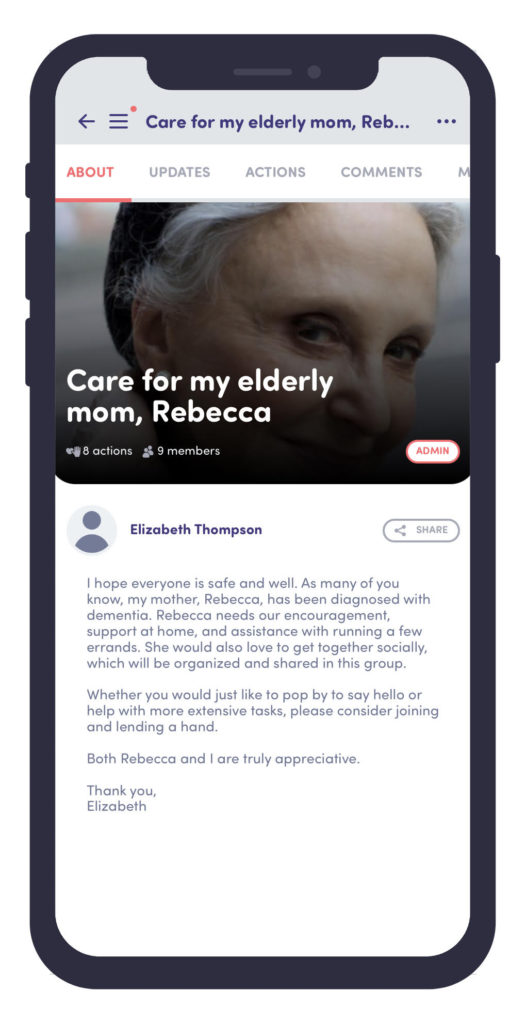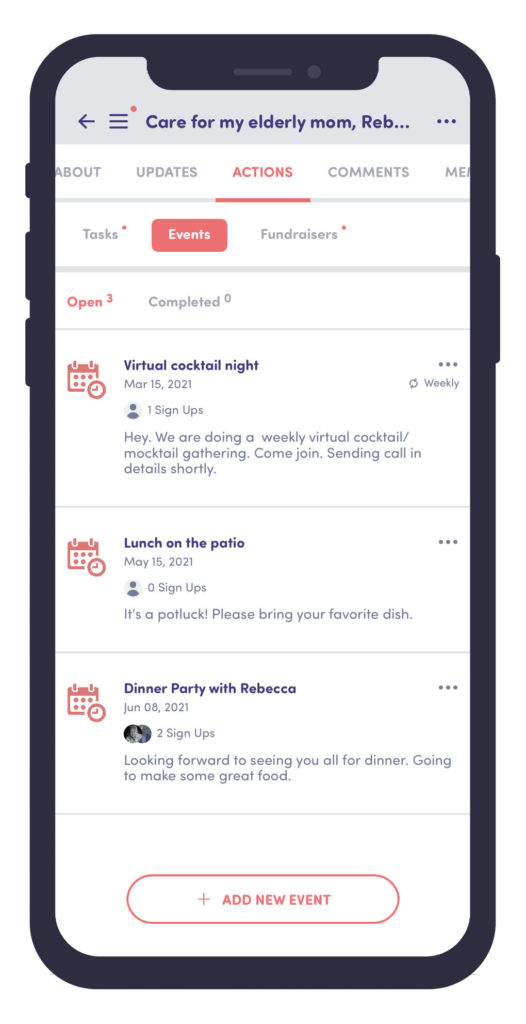If you are facing aging parents who refuse help, you are not alone. Adult children, more often than not, watch their elderly parents slipping and declining, mentally and physically. Your father may be battling dementia, and your mother broke her hip and is struggling to walk; yet, they refuse any help as they age alone in their four-story house. Aging care and health professionals offer many strategies for facing the hard conversations around arranging for help. Karelane can also help you coordinate care and support on our easy, engaging platform.

Why do elderly parents refuse help?
Aging is scary, and identity is often tied to independence. Your elderly parents are proud and resist notions that threaten their independence, pride and sense of control. Additionally, the elderly place value on their strength and ability to thrive as a self-sufficient adult. Accepting the need for care may make them feel undervalued and undesirable.
Are you responsible for your elderly parents?
In the U.S., whether or not adult children are required to care for their elderly parents varies state by state. The definition of “care” here can include financial support, or assistance with specific healthcare needs. While you may not be responsible for the welfare of an elderly parent in the U.K., many do believe there is an unspoken moral obligation to do so.
We have created an e-book to guide you as you embark upon or continue the difficult journey as a caregiver: Seven Steps to Overcome Caregiver Fatigue (hyperlink).
Can an Elderly Person Refuse Care?
Typically, an elderly person does have the right to refuse care. However, exceptions exist; if a person is determined “gravely disabled,” it is possible that interventions may take place.
If you do decide to become a caregiver, yourself, or with the help of a trusted network, we offer seven tips to help aid the difficult discussion for dealing with parents who refuse help, despite their declining state.
Strategies for Dealing with Elderly Parents who Refuse Help
1. Get professional elder care support
If you have hit a wall with your aging parents, you may need to enlist experts and ask professionals to persuade them, if necessary, that additional support is necessary for their vitality, health and happiness. Consider speaking with your parent’s doctors, counselor, friends, neighbors, social worker, geriatric care manager, or even a spiritual or religious figure. Seeking professional and community support can prove to your parents that your concerns are valid, and your parents’ well-being matters to a broader circle.
What elder care services are offered in the U.S.?
A number of government programs and services are also available in the U.S. to help pay for healthcare and offer resources and expertise outside of your personal realm. For further information, please review these Government Resources, such as Medicare, Medicaid, and the Administration on Aging (AoA), for seniors and caregivers
Your parents may be adamant about aging in place with only the support of their children. However, it could be beneficial to encourage your parents to additionally utilize Home Care Services, such as home health nurses.
What elder care services are offered in the U.K.?
In the U.K., countless resources, including national charities, societies and free advisors, are available for seniors and their caregivers.
You may also seek social care and support through United Kingdom National Health Services (NHS), the publicly funded healthcare systems of the UK. NHS offers a guide for individuals in need of support, their caregivers, and people choosing to plan for the time when additional care will be needed.
2. When to say no to elderly parents
Often, there is not much we can do but stand by, listen, watch closely, and jump in to say no when absolutely needed. Decide what issues are the most important and focus on them. Matters involving your parents’ safety, for instance, take top priority. Choose your battles wisely, and don’t be afraid to “say no” if necessary for your parent’s own wellbeing.
3. Set boundaries with difficult elderly parents
Children of elderly parents often feel that they “can’t say no.” However, as a caregiver, fatigue and exhaustion may eventually become too overwhelming without set boundaries. For your own welfare, you may need to resist: your parents who may wish to move in, unreasonable requests from siblings and paid caregivers, and community obligations that are too much on top of caregiver demands. Just because someone asks you to do something doesn’t mean you should do it. Support your parents to the best of your ability, and enlist help when needed without feeling guilty that you are not fully meeting your responsibilities.
4. Involve people your parents are comfortable with
It is critical that you surround your parents with close friends, family, and community members they trust. No one wants to lose control of their own life, particularly to strangers, so it is important your parents have full faith in the helpers around them.
Karelane provides a platform for your network to support your parents – and you – with encouragement and tasks, such as picking up medications or grocery shopping. You choose who is welcome in your support circle. Download Karelane today to begin caring on a deeper and more organized level.


5. Plan ahead and discuss the plans
Even if your parent has not been diagnosed with Alzheimer’s disease or dementia, living with any level of memory loss can be agonizing for seniors to live with, or even acknowledge. Helping your aging parents remember important dates eases frustration for everyone, and gives your parents something to look forward to.
Is there a family celebration they want to attend that’s coming up, such as an anniversary, graduation or wedding? Bring it up, talk about it frequently, and share in the excitement together with Karelane. Karelane’s event feature allows users to set up a one-time or recurring event, and invite others to join and learn more about the experience. You can even coordinate details such as who will bring the wine and arrange for the birthday cake, or even set up a fundraiser to cover any unmet costs. Karelane is freshly launched and available for download


6. Start small
When presenting your parents with options, start small. Maybe, in the beginning, a housekeeper provides in-home help around the house two days a week, or you help them with simple tasks like driving, or sifting through packages. Starting small allows your parents to adjust more easily, and may warm them up to the idea of welcoming more help. You do not want to completely overhaul their lifestyle; bringing about sudden changes can cause distress and discomfort. Gradually ushering in help shows that you respect their boundaries and independence.
With the Karelane app, you can begin coordinating just a few actions for your parent by creating a task – such as walking the dog every Wednesday – and allowing your network to assign themselves to the job. The app also provides users with the ability to chat in order to work out any details, and strategize to provide the best support possible. Consider downloading Karelane, and taking the first step.


7. Stay positive
When speaking to your elderly parents, approach the conversation from a place of positivity and optimism. Instead of telling your parents the activities they cannot do and pointing out limitations, focus on their abilities, what’s important for them to maintain, and their values. If their identity is closely tied to independence, reinforce the idea that allowing some help will enable that independence and allow them to continue the activities they enjoy. When discussing caregivers, you want to reiterate that they will be a source of companionship, not a source of restriction. You are complementing rather than changing and limiting their current lifestyle.
8. Ask them to do it for the kids, grandkids – or you
If your parents are not willing to change their behavior themselves, perhaps they will make a positive change for a loved one. Your mother may quit smoking if you argue that her second-hand smoke poses a sincere risk to her grandchildren.
Another approach to dealing with aging parents is to be direct about how it affects you. Communicate your worries to your parent, and explain how your anxieties will be tempered if he or she follows your advice. Re-frame the conversation to be about you. You’re the one who is worried, and your stress from constant concerns is becoming a burden on you, and likely your siblings. Many parents don’t like the idea of being a burden or a source of trouble for their children, so making the discussion about your needs may be another way to convince them to agree to accept help.
9. Find an outlet for your feelings
If you’re angry or resentful that your elderly parent refuses to accept help, it’s important to vent — but not to your parents. Confide in or strategize with a friend, doctor, sibling, therapist, or online support group. Expressing your emotions is especially important if you are the primary caregiver to your aging parents. No matter how deeply you care about your mom and dad, it’s easy to become overwhelmed with frustration, fear and anxiety when constantly dealing with their irrational behavior. Guard against this by caring for yourself, discussing your concerns, and finding activities to help relax and release negative emotions.
10. What to do when your elderly parent becomes irrational
Try to listen. When parents are behaving irrationally, it can be tempting to threaten to move them to a nursing home against their will, or insist you know what’s best. However, these aggressive tactics will not help, and will only drive a wedge between you and your parents.
When it comes to dealing with aging parents who may appear irrational, remember: above all, the goal is to help your parents receive the best care possible. You’re more likely to get positive results by treating your aging parents like the adults that they are, trying to understand their situation, and working together.
Conclusion
The role of a caregiver, particularly for one’s own parents, is troubling, tiresome and often overwhelming. While you, and your parents, may have the best intentions, it can be difficult to undertake your responsibilities alone. We hope you will utilize Karelane to ease the burden, find reasons to celebrate the positives, and reignite your community for impact.







